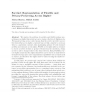Free Online Productivity Tools
i2Speak
i2Symbol
i2OCR
iTex2Img
iWeb2Print
iWeb2Shot
i2Type
iPdf2Split
iPdf2Merge
i2Bopomofo
i2Arabic
i2Style
i2Image
i2PDF
iLatex2Rtf
Sci2ools
VLDB
2006
ACM
2006
ACM
Succinct representation of flexible and privacy-preserving access rights
Abstract We explore the problem of portable and flexible privacy preserving access rights that permit access to a large collection of digital goods. Privacy-preserving access control means that the service provider can neither learn what access rights a customer has nor link a request to access an item to a particular customer, thus maintaining privacy of both customer activity and customer access rights. Flexible access rights allow a customer to choose a subset of items or groups of items from the repository, obtain access to and be charged only for the items selected. And portability of access rights means that the rights themselves can be stored on small devices of limited storage space and computational capabilities such as smartcards or sensors, and therefore the rights must be enforced using the limited resources available. In this paper, we present and compare two schemes that address the problem of such access rights. We show that much can be achieved if one allows for even a ...
Customer Access Rights | Database | Flexible Access Rights | Privacy Preserving Access | VLDB 2006 |
| Added | 05 Dec 2009 |
| Updated | 05 Dec 2009 |
| Type | Conference |
| Year | 2006 |
| Where | VLDB |
| Authors | Marina Blanton, Mikhail J. Atallah |
Comments (0)

